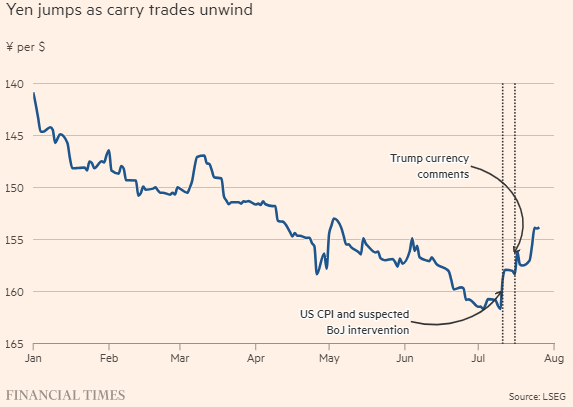The significant rebound of the Japanese yen has impacted the global market, and volatility is expected to intensify this week
The significant rebound of the Japanese yen has impacted global markets and set the stage for its best monthly performance this year, laying the groundwork for further volatility in this week's meetings between the Japanese and US central banks.
In July, as of now, the Japanese yen has risen 4.7% against the US dollar, thanks to the possibility of the Bank of Japan raising interest rates on Wednesday (July 31), narrowing the huge interest rate gap with the Federal Reserve, which had previously caused the yen to fall to decades low. Earlier this month, as the inflation rate in the United States decreased, expectations of the Federal Reserve cutting interest rates also increased.
The closure of popular "arbitrage trades" has driven the recovery of the yen, as investors borrow yen to buy higher yielding currencies and push bearish bets on the yen to their highest level in about two decades.
Analysts say that as investors reduce losses caused by arbitrage trading mistakes, they are forced to sell assets in other markets, exacerbating the significant sell-off of global technology stocks.
Athanasios Vamvakidis, Global Head of Foreign Exchange at Bank of America, said, "The foreign exchange market is currently affecting everything because arbitrage trading with yen financing is one of the most popular trades this year - reducing positions will also affect other risk positions
Although the Japanese yen stabilized last Friday, foreign exchange traders said that volatility will intensify in the coming week as the market prepares for the Bank of Japan's interest rate decision and adapts to the shift in global risk appetite and large-scale liquidation of speculative currency positions.
This prediction was made by traders from three investment banks in Tokyo at the end of last week, when the US dollar/Japanese yen exchange rate plummeted from 157.5 yen to 153.71 yen.

But traders also warned that if the Bank of Japan decides to keep interest rates unchanged on Wednesday, it could trigger a rapid reversal of the yen exchange rate, falling to a low of 161 yen per US dollar, and Japanese authorities are suspected of intervening in the exchange rate in mid July.
Benjamin Shatil, a foreign exchange strategist at JPMorgan in Tokyo, said, "The situation of the Japanese yen in the coming week may really become interesting because the setting of the Bank of Japan meeting is very different given that the market sentiment towards arbitrage trading has clearly changed
There are still many short positions in the Japanese yen at present, and if they break through the 152 level, these positions may be liquidated. At the same time, if the Bank of Japan does not make any major statements, there may be almost no resistance to the yen's decline, "he added.
Swap market traders have mixed views on the prospect of the Bank of Japan raising its benchmark interest rate by 0.15 percentage points to 0.25% this week, compared to a one-quarter probability earlier this month.
The impact of the US presidential election is also looming over this situation, including Donald Trump's statement that the US is facing a "huge currency problem" due to the weakness of the yen and renminbi, indicating that if he wins the presidential election in November, he may explore different options to devalue the US dollar.
This coincides with a significant sell-off on Wall Street, led by technology stocks.
Chris Turner, head of global research at ING, said, "The most intense trading for fund managers has always been long on technology stocks, while in the foreign exchange market it is short on the yen... The most intense trading this week has been closed, and I am sure there is some overlap between the two
Observers of the Bank of Japan believe that exchange rate fluctuations have put the central bank in a difficult situation, as the current economic situation seems to justify a slight interest rate hike. Analysts say that if the Bank of Japan decides not to raise interest rates, the market may interpret this decision as purely reactive as the Bank of Japan did not raise interest rates due to the current strength of the yen.
Turner said, "In the past two years, people have made a lot of money by shorting the yen... If the Bank of Japan doesn't raise interest rates, people will tend to short the yen again
Tips:This page came from Internet, which is not standing for FXCUE opinions of this website.
Statement:Contact us if the content violates the law or your rights
